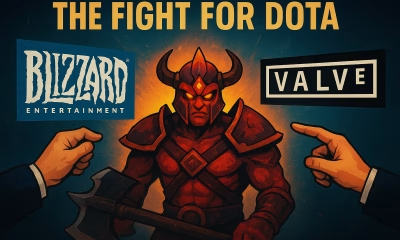Gambling
Major Gaming Companies Face Lawsuit Over Predatory Monetization and Addictive Practices
Several of the gaming industry’s most prominent companies, including Blizzard, EA, Epic Games, Ubisoft, Google, Apple, and Steam, are facing a lawsuit over allegations of predatory monetization and the implementation of purposefully addictive practices in their games. This lawsuit, filed by Casey Dunn on behalf of his 13-year-old child, marks a significant escalation in the ongoing debate surrounding the ethics of in-game purchases and the psychological impact of video games on minors.

The Core of the Lawsuit
The complaint centers around the claim that Dunn’s minor child has developed an addiction to popular games like Fortnite, Rainbow Six, Battlefield, and Call of Duty. This addiction, according to the lawsuit, has led to mental anguish, financial loss, and a host of other damages. The crux of the lawsuit is the accusation that these gaming companies have been engaging in predatory practices, targeting minors with little regulatory oversight.
Beyond Content: The Focus on Practices
Traditionally, video game regulation has revolved around content, as guided by the ESRB. However, this lawsuit challenges the practices behind the content, particularly focusing on in-game purchases and the alleged use of addictive tactics to prolong player engagement and spending. The plaintiff argues that these practices are not only harmful but are specifically designed to exploit the vulnerabilities of minors.
The Role of Platforms and Data Mining
An interesting facet of this lawsuit is the inclusion of platform providers like Google, Apple, and Steam. These platforms, which benefit financially from in-game purchases, are accused of being complicit in these predatory practices. Additionally, the lawsuit raises concerns about games linked to social media accounts, alleging that this integration is used to mine data and target players more effectively, exacerbating the issue of unregulated spending, especially among minors.
A New Angle on an Old Problem
While the gaming industry has faced legal challenges before, particularly regarding loot boxes, this lawsuit takes a broader approach. It targets the underlying practices that make such monetization strategies enticing and addictive. This approach could potentially open a new front in the battle against what many see as exploitative practices in the gaming industry.
Implications for the Industry
This lawsuit is more than a legal battle; it’s a spotlight on the ethical considerations of game design and monetization. If successful, it could lead to significant changes in how games are developed and monetized, especially those aimed at or accessible to minors. It also raises questions about the responsibility of platform providers in curbing potentially harmful practices.
Conclusion
While some may dismiss the lawsuit as overprotective or frivolous, the issues it raises are significant and warrant serious consideration. The outcome of this case could have far-reaching implications for the gaming industry, potentially reshaping how games are designed, marketed, and sold. As the legal process unfolds, all eyes will be on this landmark case and its impact on the future of gaming and esports.
Casey Dunn et al. v. Activision Blizzard et al., District Court for the Eastern District of Arkansas, Case 3:23-cv-00224-JM
Counsel for the Plaintiffs:
- Bullock Ward Mason LLC
- Lawyers: Breean Walas, Tina Bullock, Danielle Ward Mason, Rachel Minder, and Leslie Pescia in Atlanta
Image: Dall-E3


















